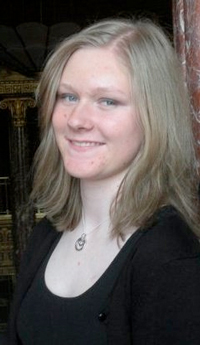by Guytano Parks

So read the printed program from the Cleveland Orchestra Youth Orchestra’s final concert of the season at Severance Hall. It describes in advance the thirty-nine graduating seniors who were congratulated with individual descriptions of the next step in their musical journeys. Among them is Hannah Moses, winner of the orchestra’s 2013 concerto competition and soloist in Dvorak’s Cello Concerto in B minor.
Miss Moses, a member of COYO since 2007, is a senior in CIM’s Young Artist Program studying with Richard Weiss of The Cleveland Orchestra. Winner of many scholarship and concerto competitions, she will continue her studies at CIM, majoring in cello performance.
Considered to be one of the greatest concertos ever written for any instrument, Dvorak’s cello concerto is a mature work which breathes with dramatic life and character. Miss Moses played the solo part with the poise and maturity of a seasoned artist, possessing both musical and technical command — the solo part in the opening movement includes double and triple-stopped chords, octaves and trills. Miss Moses, Feddeck and the orchestra made the most of the movement’s inherent melancholy and grandeur, while achieving a chamber music character through a supple sense of give and take.
Feddeck allowed for a natural unfolding and breathing in the Adagio ma non troppo. Quotes from one of the composer’s own songs, “Lasst mich allein” and aneffective recalling of the sound of a pipe organ by the oboes, clarinets and bassoons play an important role in conveying the deep emotion of this inspired second movement. The Finale: Allegro Moderato is dominated by a spirited dance melody. Among the many unexpected surprises in tempi, mood and structure is the wistful and elegiac duet which was beautifully and poignantly delivered by soloist and concertmaster.
High spirits are contrasted by contemplative and melancholy moods as the first movement’s theme returns as a variant of the second movement’s song, building up momentum toward the Allegro vivo ending. This exuberant performance was of an extremely high order, one in which Miss Moses, Feddeck and the Cleveland Orchestra Youth Orchestra may be very proud.
Barber’s first work for full orchestra, the exciting and colorful Overture to The School of Scandal, opened the concert. The close rapport between Feddeck and his orchestra was immediately apparent as details of character, dynamics, articulation and tempo, and the shifts between them were all under exacting control. Balance in all sections was more than satisfactory. Precisely played dotted rhythms, soaring melodies and colorful playing were in abundance.
The transcription for orchestra by Grzegorz Fitelberg of Szymanowsky’s Etude in B-flat minor, Op. 4, No. 3 (originally for piano) opened the second half of the concert. Remarkably similar to Rachmaninoff’s Vocalise (also subject of many a transcription), it sings in long, lugubrious lines with throbbing underlying pulses. Feddeck’s strong lyrical sense and taffy-pulling legato successfully coaxed the same from the musicians, carrying the piece through to its fading, hushed ending.
Perhaps the most exuberant performance on this afternoon’s concert was the reading of Death and Transfiguration, Op. 24 by Richard Strauss, a master of the orchestral tone poem. Based on a scenario of his own devising, Strauss describes the last hours of a dying man. Whether one reads the program notes or not, the journey from darkness to light and everything else in between is sensed in this profound and transformational work. What was achieved by the Cleveland Orchestra Youth Orchestra and conductor James Feddeck was nothing short of miraculous.
A touching and bittersweet moment occurred before the Strauss. Feddeck, who is completing his tenure with the Severance Hall ensembles, spoke eloquently to the audience, thanking them and the marvelously talented and dedicated musicians on stage for the past four years of his Cleveland experience. All who were within reach in the orchestra received hugs and kisses from Feddeck as he walked through the ranks, and a standing ovation with prolonged, uproarious applause by all resounded throughout Severance Hall. It is both inspiring and comforting to know that these young, gifted musicians are the future of classical music. Bravo!
Published on ClevelandClassical.com May 20, 2013
Click here for a printable version of this article.



